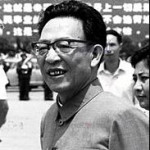 Zhang Chunqiao (1917-2005, Wade-Giles: Chang Ch’un-chiao) was a regional CCP leader who rose to prominence as a member of the Gang of Four. Zhang, the son of a prosperous Shandong landlord, became a CCP member, writer and literary critic in 1930s Shanghai. He later relocated to the Yan’n Soviet, where he worked as a propagandist. During the 1950s Zhang penned articles sympathetic to the Great Leap Forward, bringing him to the attention of Mao Zedong. In the early 1960s we began collaborating closely with Jiang Qing on art and culture, while continuing to write stinging criticisms of selected political figures. In 1965 Zhang, probably at Jiang Qing’s instruction, began turning his pen on Mao’s enemies and rivals within the party, including Liu Shaoqi. This marked Zhang’s elevation to the Cultural Revolution committee and his place in the Gang of Four. Still based in Shanghai, Zhang set up his own people’s commune there and wielded enormous influence. In 1973 Zhang became a full member of the Politburo; two years later he became deputy premier, replacing Deng Xiaoping, a man he had relentlessly attacked in propaganda. He was arrested in October 1976, put on trial and sentenced to death, though this was later commuted to life imprisonment. He was released in 1998 and died in Shanghai in 2005.
Zhang Chunqiao (1917-2005, Wade-Giles: Chang Ch’un-chiao) was a regional CCP leader who rose to prominence as a member of the Gang of Four. Zhang, the son of a prosperous Shandong landlord, became a CCP member, writer and literary critic in 1930s Shanghai. He later relocated to the Yan’n Soviet, where he worked as a propagandist. During the 1950s Zhang penned articles sympathetic to the Great Leap Forward, bringing him to the attention of Mao Zedong. In the early 1960s we began collaborating closely with Jiang Qing on art and culture, while continuing to write stinging criticisms of selected political figures. In 1965 Zhang, probably at Jiang Qing’s instruction, began turning his pen on Mao’s enemies and rivals within the party, including Liu Shaoqi. This marked Zhang’s elevation to the Cultural Revolution committee and his place in the Gang of Four. Still based in Shanghai, Zhang set up his own people’s commune there and wielded enormous influence. In 1973 Zhang became a full member of the Politburo; two years later he became deputy premier, replacing Deng Xiaoping, a man he had relentlessly attacked in propaganda. He was arrested in October 1976, put on trial and sentenced to death, though this was later commuted to life imprisonment. He was released in 1998 and died in Shanghai in 2005.
Information and resources on this page are © Alpha History 2018-23.
Content on this page may not be copied, republished or redistributed without the express permission of Alpha History. For more information please refer to our Terms of Use.
This website uses pinyin romanisations of Chinese words and names. Please refer to this page for more information.
